- Home
- Taylor Caldwell
I, Judas Page 14
I, Judas Read online
Page 14
“And she is healed?”
“But of course,” Zebedee said. “He merely touched her hand and the fever left her, and she arose and made their dinner, she felt so relieved.”
He had then healed a host of others whom Andrew had arranged to be there, one of whom had attacked him before he could cast the devil out of him. The crusts and sores had fallen from another, a leper normally forbidden in the community, when Jesus passed his hand over the disfigured face.
Levi the Publican had listened with a wondering look. “All this has been done,” he said, “to fulfill that spoken by Isaiah: ‘He took away our infirmities and lay bare our sickness.’”
Salome looked up with a chuckle. “You are not saying that this village boy is the Messiah? How absurd.”
Her sons chided her with their eyes. “All right,” she said, “I know his mother had a vision, but many mothers have visions about their children. That establishes nothing.”
“You will come to him on bended knee one day. Mother, and be happy to acknowledge that he is sent by God. I only wish that I could tell you what James and I saw on that mountain.”
“All right, John.” She kissed his forehead. “I fear that I feel only a mother’s resentment that my two sons give up their home and their right to a family of their own to follow the uncertain path of a leader who takes them God only knows where.”
I had held my question for a while. “How is it that Simon-bar-Jonah is a disciple, since the disciples must have neither wife nor child?”
“That is a good question,” put in Salome. “But Simon, like Andrew, leaves his wife and a child to be supported by old Jonah and his wife. You would think that he would pick only on single men.”
John and James protested together. “But, Mother,” said John, “each disciple stands for something special that Jesus sees in him.”
She snorted. “I am a Galilean born and bred, but since when does this remote region hold a monopoly on geniuses in Israel? Argue not this matter with any Judean you meet on the road.”
In spite of ourselves, we all laughed together, and the tension was eased.
“Go now,” she said, “and meet with your Savior. And bid him repair the bench he once made for this house. One of his legs fell off. I hope this has no great significance, for I understand he tells parables on less ground than this.”
Zebedee shook his head wearily, and then his voice rose so that we understood why he was called the Thunderer. “Woman, hold your tongue. Your sons go to serve God. Any fool can tell that Jesus is no ordinary man, even if he did nothing but walk through this community without raising a hand to heal the sick or bless the whole.”
She closed her eyes. “All right,” she said with a sigh, “I bid a tearless goodbye to the children of my womb.”
I knew not what to expect when we marched silently into Jonah’s house and were led by a servant into an upstairs room. We were greeted quietly by Andrew and Simon-bar-Jonah, who was variously known as Peter since his own baptism by John. Jesus sat in the center on a large cushion, his piercing eyes sending a welcome to us all.
“I have summoned each of you for a reason that may not become apparent until your last breath. And then you shall know eternity, for you are the Chosen of God. Remember this well, however spitefully the world considers you: that for judgment came I into this world that they who see not may see, and those who see may become blind in their blindness.”
His words fell swiftly like the strokes of a sword.
“Six of you have already been blessed with the living water, and now the six remaining shall be sprinkled with the water of a new life, by Simon-bar-Jonah and Andrew, for I baptize not after John.”
I could see the others were as excited as I was. Their faces were pale, but there was a look of exaltation in their eyes.
“First,” said Jesus, dropping his hand into the water, “let me bless the Holy Spirit which makes you as one with God, with hearts hungering to help humanity.”
I felt myself tremble, thinking now how unworthy I was. Thoughts of Rachel and my mother, mingled with memories of my childhood, of Joseph of Arimathea, Nicodemus, Joshua-bar-Abbas, Cestus and Dysmas, Annas and Caiaphas, Gamaliel, all came crashing together in my head.
Andrew beckoned Levi forward, and Simon-bar-Jonah, with a grandeur I would not have expected, sprinkled him lightly with water. Yet Jesus, though he did not baptize, still dominated the ceremony.
“Levi the Publican,” said Jesus, “I name you Matthew. I took you from your office, and you are indeed, as this name indicates, a gift of the Lord. Your name shall be coupled with mine as long as God’s name is remembered, for you shall be our chronicler.”
Simon Zelotes was next, and as he received the water, Jesus said solemnly: “A proud son of Galilee, and a patriot as well, who speaks for the Zealots in their struggle to rid the homeland of the invader. Be as great a warrior, now, Simon, for an even greater cause.”
Even as I wondered what cause could be greater, his eyes looked fondly on the two sturdy Galileans who were obviously twins. “James and Jude,” he called, “sons of Mary of Alpheus, who stand as a constant reminder that no family ties are as meaningful as those consecrated in God. You who were my cousins are joined now by a bond dearer than blood.”
The next was Didymus, whom he called Thomas, which also signified a twin. “You shall obtain glory for leaving your doubts, and your own twin, for a doubtful cause. And though your doubts return, your faith shall redeem you.”
“Judah!” I jumped at his call. “A proud Judean of a proud house. You shall sit on my right, and in the unaccountable ways of the Lord you shall serve in your own way to establish the living truth of life everlasting.
“Whenever the name Jesus Christ is mentioned, yours shall be added almost in the same breath. For though you are the twelfth to be named, your fame shall not be least. You shall be our treasurer, and guard the purse strings, for only a Judean versed in his father’s estates can manage our affairs well enough to keep flesh and spirit together while we minister to the poor.”
His eyes held mine, and his dear face softened for a moment.
“You, Judas, shall make your first excursion into the countryside with Matthew, who was Levi, and you shall carry my word and heal in my name. Remember that your power comes from the Father through his Son. For all things are delivered to me of my Father. And no man knows who the Son truly is but the Father, nor who the Father is but the Son, and he to whom the Son will reveal him.”
I had no sense of his power coming through me. How could I make the leper whole, or make steady the hand afflicted with palsy?
He seemed to have read my mind.
“I say this to the Twelve, all of whom I love equally, that with faith in the Father you can do what the Son has shown you to do.”
I felt almost naked in my helplessness.
“How do we support ourselves?”
“Spoken like a true believer.” He had a sardonic smile. “Ask the birds and the butterflies, the lilies in the fields, which neither toil nor spin. God takes care of them, as he will you. Forsake not so much your worldly goods as your worldly thoughts, go forth like the deputies of the Lord, for that you are, and embrace the world with the love of God in your hearts.”
Matthew, too, was confused.
“And when begins my assignment to record this ministry for those who follow?”
“It has already begun, for your mind is already teeming with the words heard here today, and the activities at Bethabara and Cana, and even on the mountain, where you were not.”
Matthew still hesitated. “May I go anywhere and ask what I like about your mission from God?”
“Yes, even to Nazareth.”
In nearly everything, Jesus showed an awareness of his Judean heritage. Just as Moses appointed twelve tribal chieftains, so Jesus chose twelve whom he called Apostles.
“As Apostle means one sent,” he said, “you are sent for me.”
We were also discipl
es, pledged to his teachings, but our apostolic authority rested in the intimacy we shared as his family.
“Henceforth I call you not servants, for the servant has no idea what his master is about. I shall call you my friends, for everything I have of my Father I shall pass on to you. You shall bring forth sweet and bitter fruit, and whatsoever you ask of the Father in my name he shall grant you.”
Each Apostle was authorized to name five disciples, Jesus himself selecting the rest, until there were seventy in all. Moses had named as many, and this number ruled the affairs of the Sanhedrin.
In choosing this number did Jesus challenge the authority of the Temple elders?
He smiled. “Our whole ministry, Judah, is a challenge to what the Temple does.”
Some of my brethren found me contentious, but as Jesus looked around at these pacific faces, he said with a reassuring twinkle: “I come not to bring peace but to stir up the established order.”
Simon-bar-Jonah, as usual, held up his hand.
“And how shall this be done, Master?”
“With the truth, for the truth is God’s revelation, and it does not vary from King David’s time to this. Do you not remember David saving to Solomon: ‘Keep the charge of the Lord thy God, to walk in his ways, to keep his statutes, and his commandments, and his judgments, and his testimony, that you may prosper in all that you do’?”
There were smiles of satisfaction among these simple Galileans. For as they felt themselves moving in the footsteps of Abraham and Moses, they felt comfortably reassured. Except for Zelotes there was not a revolutionary in the lot.
Jesus had not finished. “And David spoke that day of the promise made by the Lord. ‘If your children walk before me in truth with all their heart and with all their soul, there shall not fail you a man on the throne of Israel.’”
“Are you he whom your father David mentioned?” I asked.
“I am he,” he said, smiling, “whom the Heavenly Father mentioned.”
Philip reflected the general bewilderment.
“Master, show us the Father, and we shall be satisfied.”
“If you believe not in what I do, how can you believe in what Moses did?”
Matthew, whom I still thought of as Levi, obviously took his role of chronicler with great seriousness, for he was already scribbling on thin sheets of parchment, with a ruffled brow.
“If you come only to redeem Israel by the law of Moses, Master, how does your mission differ from Elijah’s, who banished false Gods from Israel?”
The Master sighed. “I do not come to change a tittle of God’s law. God cares not what man eats, nor on what platter it is served, as long as that man serves Him by loving his neighbor and himself.”
I was not sure I had heard correctly. “Is this not a form of egomania, condemned even by the Greeks in their fable of the beautiful youth Narcissus, who fell in love with his own image and died of unrequited love?”
“To love oneself, as God would have it, one must first esteem his own being. He must be honest in all things, treat others as he would be treated, and be true to himself. Without self-respect, he cannot command the respect of others. Nor will his head rest easy on his pillow.”
Matthew was still not satisfied. “But are not the books of Moses supreme in Israel for all time?”
“In matters where God’s voice is plain.”
“How does one know God’s voice from the interpreter’s?”
Jesus smiled. “You see, I have made a good choice. His gospel will be preached even in Rome one day, and will be favored of the Jews, even as John’s word will strike a chord with the Gentiles.”
John blushed at being singled out.
“Tell them, John, what you saw on the mountain. This shall be an answer to Matthew and the rest.”
“But, sir,” said Simon-bar-Jonah, “you enjoined us to relate this vision to no man.”
“True,” said Jesus, “but I keep nothing from any of you, for the knowledge shall be helpful in doing God’s work. What John and James and Simon-bar-Jonah were privileged to know then, all of you are now privileged to know.”
John stood up. and his fair face, with its perfectly chiseled features, seemed to glow from within.
“It was an exhilarating day,” said John, “the mountain air was crisp and clear, and there was not a cloud in the sky. I looked at Simon and James, and could see them breathing deeply, savoring the freshness as if it were wine. Then my eyes traveled to the Master, and I saw him in a white light, and his face shone as the sun. He appeared to be conversing with two figures cloaked radiantly in the light, speaking as if they were Moses and Elijah. Simon-bar-Jonah suggested we make a tabernacle of branches of palm leaves for each of the prophets who appeared with the Master. But even as Simon spoke, a bright cloud loomed out of the blue sky and cast Moses and Elijah in its shadow, so that they were no longer to be seen or heard. A voice full of majesty then rolled out of the cloud and said: ‘I have sent you my beloved son, in whom I am well pleased. Listen to him.’”
At this heaven-borne voice, the disciples fell on their faces, afraid to peer into the cloud, for only Moses and Elijah had seen God’s countenance and lived. But Jesus reached down and touched them. “Arise, and be not afraid, for there is no harm in your Father,” he said.
As they came down from the mountain, the disciples looked apprehensively over their shoulders and spoke not of the voice but of Moses and Elijah.
“Why, Master,” asked a tremulous Peter, “were these two overshadowed by a bright cloud, while the light remained with you?”
Jesus’ eyes held an ironic glint.
“You have answered your own question, Simon-bar-Jonah. The others faded into the past, while the Son of Man gave forth new-light.”
“Does your word then take precedence over theirs?”
“Did you not hear the voice say: ‘Listen to him’?”
Their minds were still not clear. “But has it not been said that before the Son arrives Elijah shall come first?”
“He would not have been seen had he not already come,” Jesus replied.
And they understood that he referred to John the Baptist, who had borne Elijah’s spirit in his flesh.
There was a hush as John finished his recital, only Matthew’s scratching quill marring the silence.
I found it important that the extent of his mission be defined.
“If God is infinite, then is not the Son infinite as well?”
Jesus’ eyes held my own.
“So long as he does God’s will.”
“Then what is the full meaning of God’s removing the light from the prophets who were sent to free Israel?”
Jesus’ eyes moved slowly around the room.
“God’s light is no longer for Israel alone. There is a new prophet and a new day.”
Chapter Seven
THE VIRGIN MOTHER
SHE DID NOT WONDER why we were there, but quietly put forward flat cakes of barley bread, some honey, and wine.
“My son is not home,” she said in a voice as clear as a bell.
“I know, for we come from Bethsaida.”
“Yes, he stays with the sons of Jonah and their families.”
She was completely without guile or artifice. She sat with her hands folded before her, her dark eyes looking out with tranquillity on the world.
“You must be proud to be his mother,” I said rather lamely.
“Does he send you to me?” she inquired.
“No, but I would know more about him.”
“He has no secrets.”
“It is about his birth,” said I in confusion. “Joseph of Arimathea has told me some things, but I would know more.”
Her eyes peered into mine, and I felt, for a moment, as though my very soul was bared.
“As you will,” said she. “None can harm him except God be willing.”
“I would defend him to the death. I adore him.”
She gave me a mystifying smile, and I saw c
ompassion in her eyes.
“What is it you would know?”
“I cannot understand why a husband would take a wife about to give birth on so arduous a journey. It is not what the midwives would prescribe.”
“My husband had his reasons.”
“But it was surely not for the census, since only adult males were commanded to enroll in the place of their birth.”
Her eyes never left mine.
“I went because God willed it.”
“So that he could be born in Bethlehem?”
She nodded, and again I marveled at the dewy freshness of her countenance, so like a girl’s, so like a virgin’s, in fact.
“He was born where it was intended he be born.”
Could it be possible, in the realm of human affairs, that the mighty Caesar Augustus, ruler of the world, had issued his census-taking order as an unwitting, unbelieving instrument of a God whose ways were so often obscure? It was a mind-boggling thought.
“You knew then”—I hesitated—“whom you were carrying?”
I thought I detected an impish light in her eyes, but she replied with her wonted serenity.
“Both Joseph and I knew, for we were given a vision through the angels of the Lord.”
Never having had a vision myself, I questioned the visions of others. But Matthew was not so skeptical. Or else, like many chroniclers, he was unwilling to dig too deeply lest he spoil a good story. With soft words, he encouraged the mother to describe the vision however she remembered it.
She smiled. “How does one forget a visit from the Lord?”
It had occurred in the evening, after she had put away the dishes. Joseph, to whom she was betrothed, was reading from the Psalms by the flickering light of a lamp. She suddenly felt a little drowsy and sat down to clear her head.
At first she thought it a dream. She looked over to Joseph and could see his lips moving as he read. So it was certainly no dream. The vision was in white, and there was a halo around its head. It looked like she had thought a vision should look, ethereal and pure, with a clear voice and a pristine authority almost divine in its regality.
“Mary, daughter of David,” it said, “you are blessed among women, for you have found favor with God, and you shall bring forth a son who shall be called Joshua (that shall become Jesus), meaning the savior of the Lord. He shall be called the Son of the Highest, and the Lord God shall prepare for him the throne of his father David. And he shall reign over the House of Jacob forever, and of his kingdom there shall be no limit, even unto the Gentiles shall he prevail.”

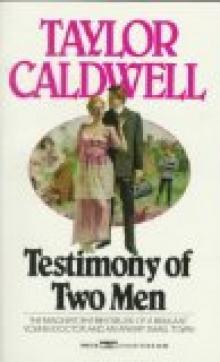 Testimony of Two Men
Testimony of Two Men Wicked Angel
Wicked Angel The Arm and the Darkness
The Arm and the Darkness Answer as a Man
Answer as a Man Grandmother and the Priests
Grandmother and the Priests On Growing Up Tough: An Irreverent Memoir
On Growing Up Tough: An Irreverent Memoir Ceremony of the Innocent
Ceremony of the Innocent The Listener
The Listener Bright Flows the River
Bright Flows the River The Earth Is the Lord's
The Earth Is the Lord's Dialogues With the Devil
Dialogues With the Devil A Tender Victory
A Tender Victory This Side of Innocence
This Side of Innocence To Look and Pass
To Look and Pass The Strong City
The Strong City Balance Wheel
Balance Wheel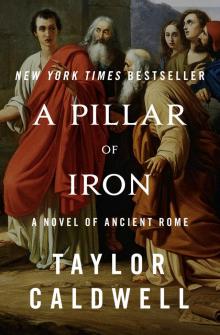 A Pillar of Iron: A Novel of Ancient Rome
A Pillar of Iron: A Novel of Ancient Rome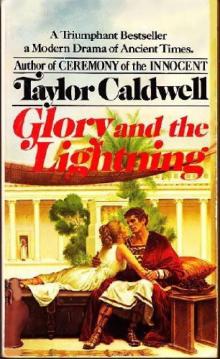 Glory and the Lightning
Glory and the Lightning Dear and Glorious Physician
Dear and Glorious Physician The Wide House
The Wide House The Final Hour
The Final Hour Never Victorious, Never Defeated
Never Victorious, Never Defeated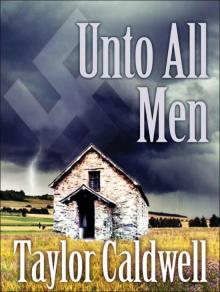 Unto All Men
Unto All Men The Turnbulls
The Turnbulls Your Sins and Mine: The Terrifying Fable of a World Without Faith
Your Sins and Mine: The Terrifying Fable of a World Without Faith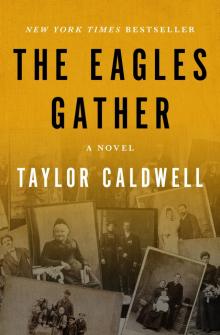 The Eagles Gather
The Eagles Gather Let Love Come Last
Let Love Come Last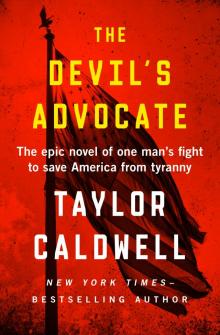 The Devil's Advocate: The Epic Novel of One Man's Fight to Save America From Tyranny
The Devil's Advocate: The Epic Novel of One Man's Fight to Save America From Tyranny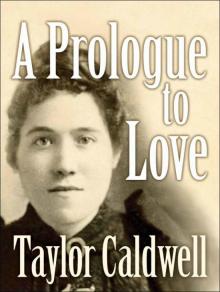 A Prologue to Love
A Prologue to Love Maggie: Her Marriage
Maggie: Her Marriage The Late Clara Beame
The Late Clara Beame Melissa
Melissa Great Lion of God
Great Lion of God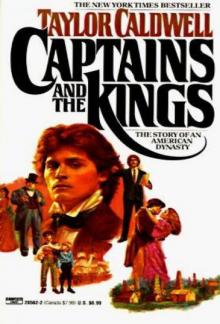 Captains and the Kings
Captains and the Kings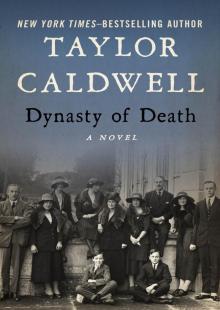 Dynasty of Death
Dynasty of Death No One Hears but Him
No One Hears but Him The Sound of Thunder
The Sound of Thunder There Was a Time
There Was a Time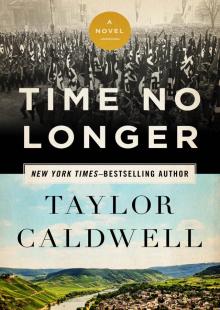 Time No Longer
Time No Longer I, Judas
I, Judas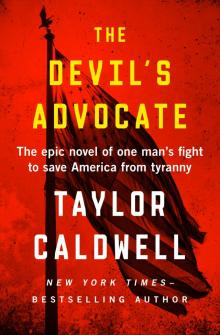 The Devil's Advocate
The Devil's Advocate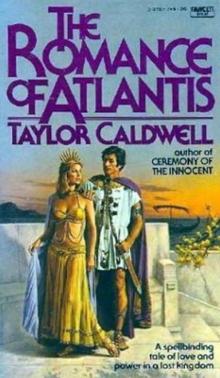 The Romance of Atlantis
The Romance of Atlantis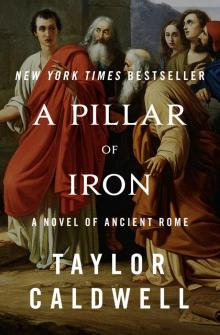 A Pillar of Iron
A Pillar of Iron On Growing Up Tough
On Growing Up Tough Your Sins and Mine
Your Sins and Mine